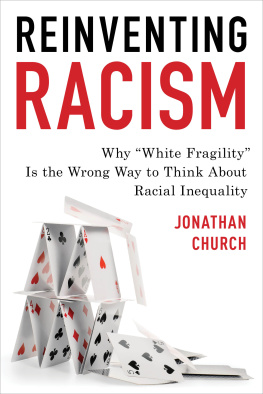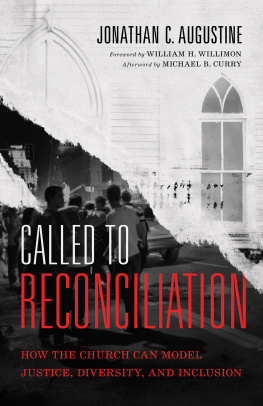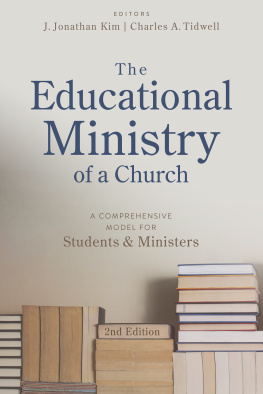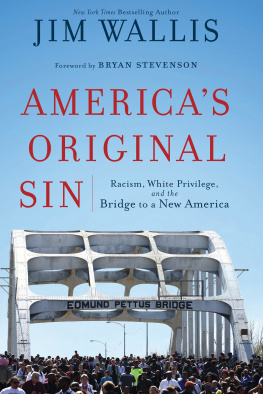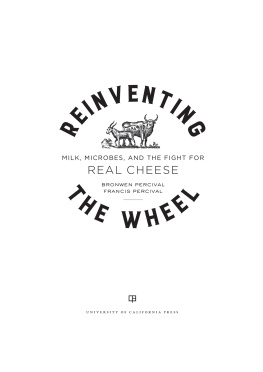Jonathan D. Church - Reinventing Racism
Here you can read online Jonathan D. Church - Reinventing Racism full text of the book (entire story) in english for free. Download pdf and epub, get meaning, cover and reviews about this ebook. year: 2012, publisher: Rowman & Littlefield Publishers, genre: Politics. Description of the work, (preface) as well as reviews are available. Best literature library LitArk.com created for fans of good reading and offers a wide selection of genres:
Romance novel
Science fiction
Adventure
Detective
Science
History
Home and family
Prose
Art
Politics
Computer
Non-fiction
Religion
Business
Children
Humor
Choose a favorite category and find really read worthwhile books. Enjoy immersion in the world of imagination, feel the emotions of the characters or learn something new for yourself, make an fascinating discovery.
- Book:Reinventing Racism
- Author:
- Publisher:Rowman & Littlefield Publishers
- Genre:
- Year:2012
- Rating:5 / 5
- Favourites:Add to favourites
- Your mark:
- 100
- 1
- 2
- 3
- 4
- 5
Reinventing Racism: summary, description and annotation
We offer to read an annotation, description, summary or preface (depends on what the author of the book "Reinventing Racism" wrote himself). If you haven't found the necessary information about the book — write in the comments, we will try to find it.
Reinventing Racism — read online for free the complete book (whole text) full work
Below is the text of the book, divided by pages. System saving the place of the last page read, allows you to conveniently read the book "Reinventing Racism" online for free, without having to search again every time where you left off. Put a bookmark, and you can go to the page where you finished reading at any time.
Font size:
Interval:
Bookmark:
Reinventing Racism
Reinventing Racism
Why White Fragility Is the Wrong Way to Think about Racial Inequality
Jonathan D. Church
ROWMAN & LITTLEFIELD
Lanham Boulder New York London
Published by Rowman & Littlefield
An imprint of The Rowman & Littlefield Publishing Group, Inc.
4501 Forbes Boulevard, Suite 200, Lanham, Maryland 20706
www.rowman.com
6 Tinworth Street, London SE11 5AL, United Kingdom
Copyright 2021 by Jonathan D. Church
All rights reserved. No part of this book may be reproduced in any form or by any electronic or mechanical means, including information storage and retrieval systems, without written permission from the publisher, except by a reviewer who may quote passages in a review.
British Library Cataloguing in Publication Information Available
Library of Congress Cataloging-in-Publication Data
Names: Church, Jonathan D., 1978- author.
Title: Reinventing racism : why white fragility is the wrong way to think about racial inequality / Jonathan Church.
Description: Lanham : Rowman & Littlefield, [2020] | Includes bibliographical references . | Summary: The theory of white fragility is one of the most influential ideas to emerge in recent years on the topics of race, racism, and racial inequality. White fragility is defined as an unwillingness on the part of white people to engage in the difficult conversations necessary to address racial inequality. This fragility allegedly undermines the fight against racial inequality. Despite its wide acclaim and rapid acceptance, the theory of white fragility has received no serious and sustained scrutiny. This book argues that the theory is flawed on numerous fronts. The theory functions as a divisive rhetorical device to shut down debate. It relies on the flawed premise of implicit bias. It posits a faulty way of understanding racism. It has serious methodological problems. It conflates objectivity and neutrality. It exploits narrative at the expense of facts. It distorts many of the ideas upon which the theory relies. This book also offers a more constructive way to think about Whiteness, white privilege, and white fragility, pointing us to a more promising vision for addressing racial inequality Provided by publisher.
Identifiers: LCCN 2020035500 (print) | LCCN 2020035501 (ebook) | ISBN 9781475858174 (hardcover) | ISBN 9781475858181 (paperback) | ISBN 9781475858198 (ebook)
Subjects: LCSH: WhitesAttitudes. | WhitesPsychology. | Discrimination. | Racism.
Classification: LCC HT1575 .C58 2020 (print) | LCC HT1575 (ebook) | DDC 305.809dc23
LC record available at https://lccn.loc.gov/2020035500
LC ebook record available at https://lccn.loc.gov/2020035501
 TM The paper used in this publication meets the minimum requirements of American National Standard for Information Sciences Permanence of Paper for Printed Library Materials, ANSI/NISO Z39.48-1992.
TM The paper used in this publication meets the minimum requirements of American National Standard for Information Sciences Permanence of Paper for Printed Library Materials, ANSI/NISO Z39.48-1992.
Dedicated to David Randall Church, Linda Carroll Church, and Lincoln Lee Simmons-Church
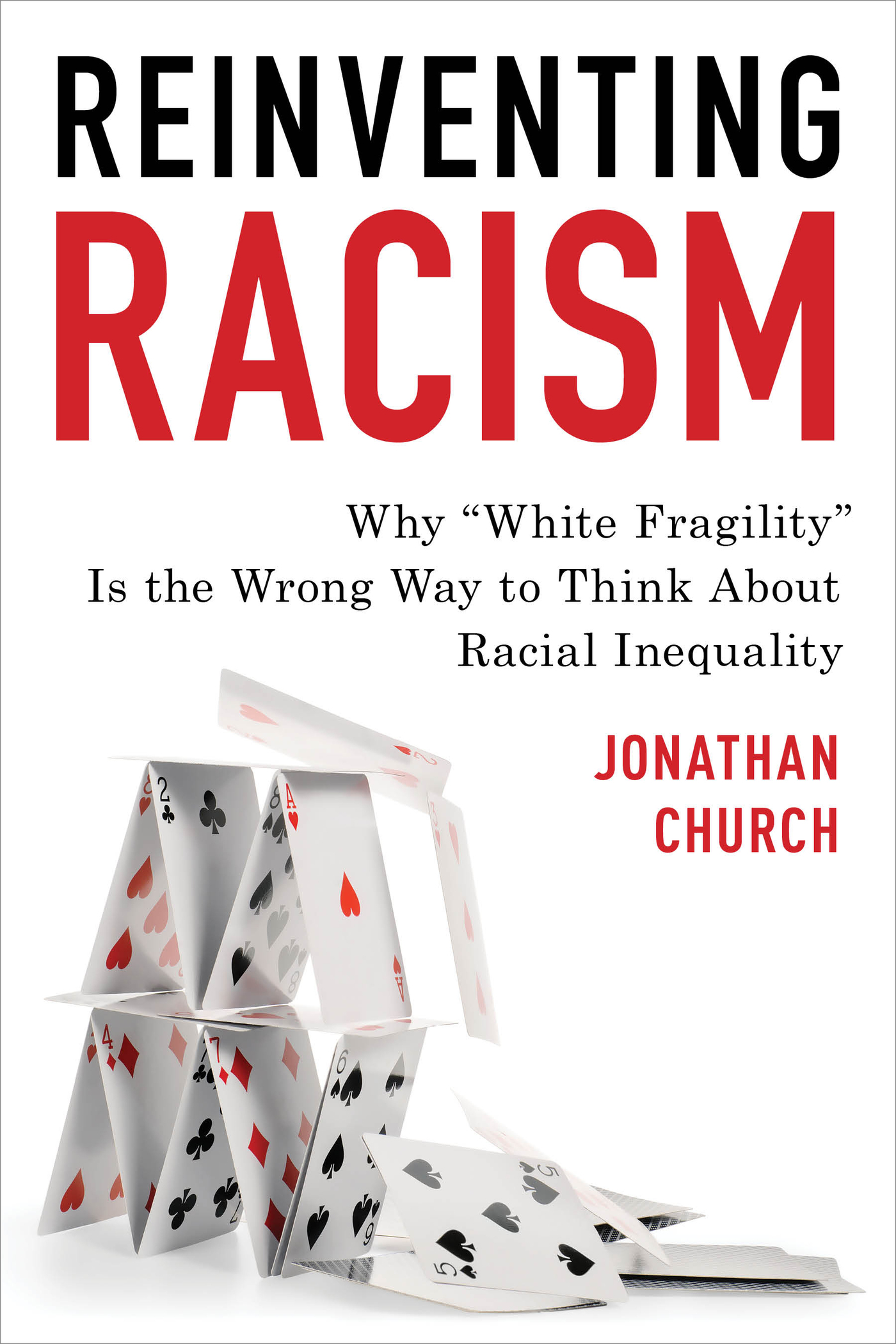
I begin with an expression of sincere gratitude to the editors of Areo, Quillette, Arc Digital, The Agonist Journal, and Merion West. In particular, I thank Claire Lehmann and Jamie Palmer for publishing my first article on white fragility, as well as Christopher DeGroot, Berny Belvedere, and Erich Prince for publishing subsequent articles. I reserve special gratitude to Areo editors Helen Pluckrose and Iona Italia, who published several essays that established a systematic critique of the theory of white fragility. These articles all laid the foundation for a more extensive, thorough, and comprehensive critique of white fragility theory, which the reader will find in this book.
Peter Boghossian deserves my genuine thanks for his support and encouragement. I also am indebted to James Lindsay and Helen Pluckrose for the insights I gleaned from their sustained critique of critical social justice orthodoxy. Wilhelm Cortez deserves credit for giving me the opportunity to publish several articles on social justice at The Good Men Project when I began thinking about the controversies in social justice activism that have emerged in the 2010s.
I am grateful to Philadelphia public school teacher Christopher Paslay for his review of the manuscript for this book. I would be exceedingly remiss not to thank Donald Weise for his thorough review of the manuscript, and for his insights over the years on how to be a better writer. Lee Jussim and Gregory Mitchell deserve recognition for their thorough reviews of my chapter on the implicit bias paradigm. I also appreciate review and encouragement from Philip Tetlock and Aaron Kindsvatter. Jeffrey Badger has my thanks for helping to envisage the books cover design.
Finally, I would like to thank Curtis Bowman, who taught many of the philosophy courses I took as an undergraduate student at the University of Pennsylvania. Dr. Bowman, a popular professor in the Penn philosophy department during the late 1990s and early 2000s, was an engaging teacher who helped me understand many of the ideas that underlie continental philosophy and that have become relevant to a critique of white fragility theory as well as controversies surrounding social justice scholarship and activism in the first decades of this century.
If you keep up with progressive lexicons on racism, you have probably heard of the term white fragility. The brainchild of sociologist and social justice activist Robin DiAngelo, white fragility has gained much attention in academic and progressive circles in recent years as a concept that goes a long way in ostensibly explaining why its supposedly so hard to talk to white people about racism.
According to DiAngelo, white people have been [s]ocialized to live with a deeply internalized sense of superiority and entitlement but they are not consciously aware of it. As a result, they experience race-based stress when faced with a challenge to their racial worldview because they perceive it to be an affront to their identities as good, moral peoplean unfair moral offense, as well as an attack on their rightful place in the hierarchy. This makes it hard to talk to white people about how their attitudes and beliefs make them complicit in the perpetuation of institutional racism.
This racialized consciousness has become so entrenched that, as DiAngelo puts it, even a minimum amount of racial stress becomes intolerable, triggering a range of defensive moves. These moves include the outward display of emotions such as anger, fear, and guilt, and behaviors such as argumentation, silence, and leaving the stress-inducing situation. As a rule, white people are simply not interested in the interrogation of Whiteness and white privilege. As a result, they are ill-equipped to tackle systemic racism. When confronted with challenges to interrogate Whiteness and white privilege, they feel blindsided and become defensive. This white fragility gets in the way of the pursuit of racial justice and keeps white supremacy in place.
Robin DiAngelo, a white woman with a PhD in multicultural education, proposed this concept in a 2011 paper in the International Journal of Critical Pedagogy.
DiAngelo proposed the concept of white fragility as one aspect of Whiteness. But it is really a theory about Whiteness, white privilege, and the perpetuation of racism in America. In this book, I argue that the theory is unhelpful, and even undermines the effort to reduce racial inequality. In chapter 3, we explore the meaning of Whiteness and how it relates, or does not relate, to racism. In the final chapter, we explore a better way to think about Whiteness and white privilege. The remainder of the book explains the conceptual, empirical, and logical flaws in the theory of white fragility.
Next pageFont size:
Interval:
Bookmark:
Similar books «Reinventing Racism»
Look at similar books to Reinventing Racism. We have selected literature similar in name and meaning in the hope of providing readers with more options to find new, interesting, not yet read works.
Discussion, reviews of the book Reinventing Racism and just readers' own opinions. Leave your comments, write what you think about the work, its meaning or the main characters. Specify what exactly you liked and what you didn't like, and why you think so.

